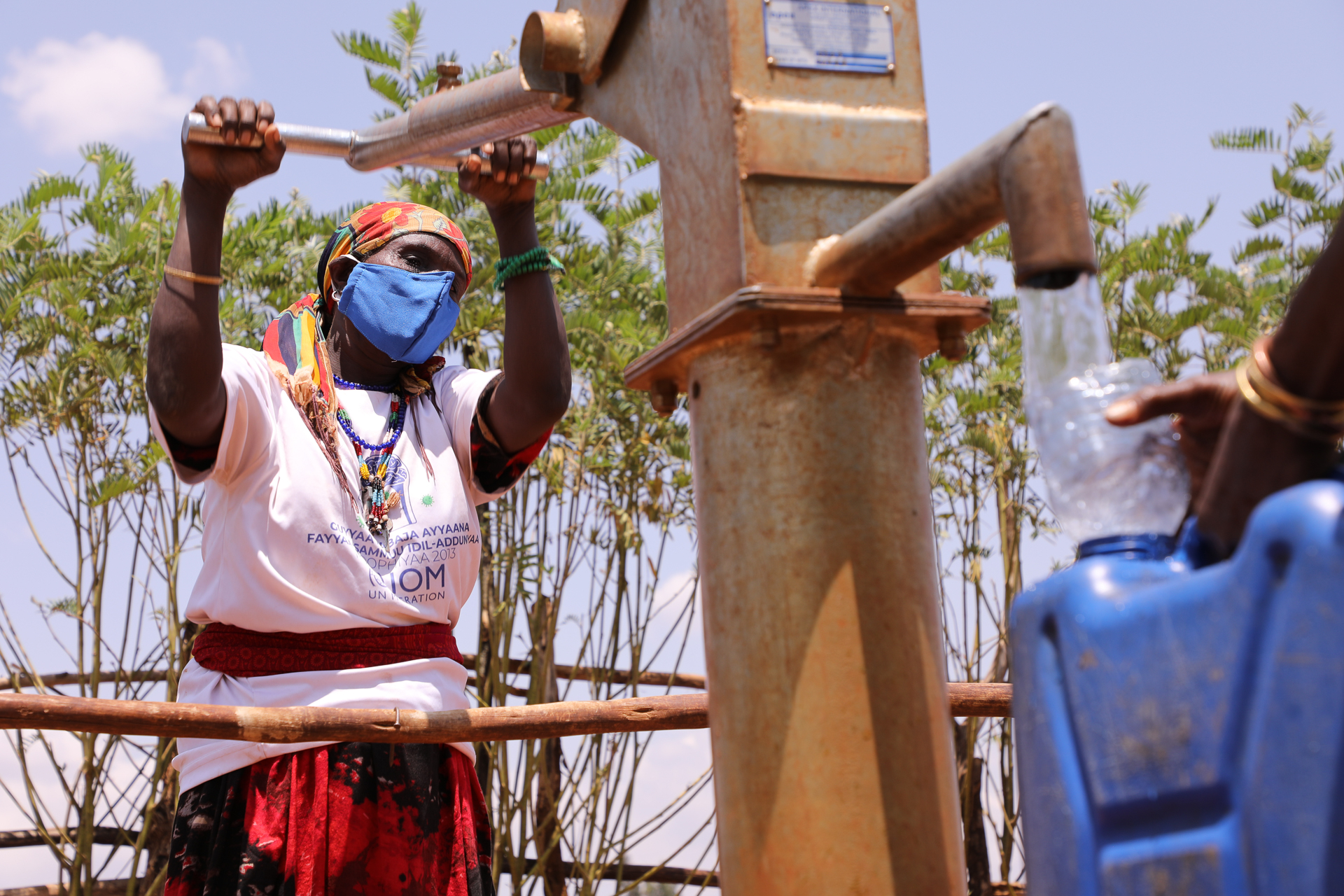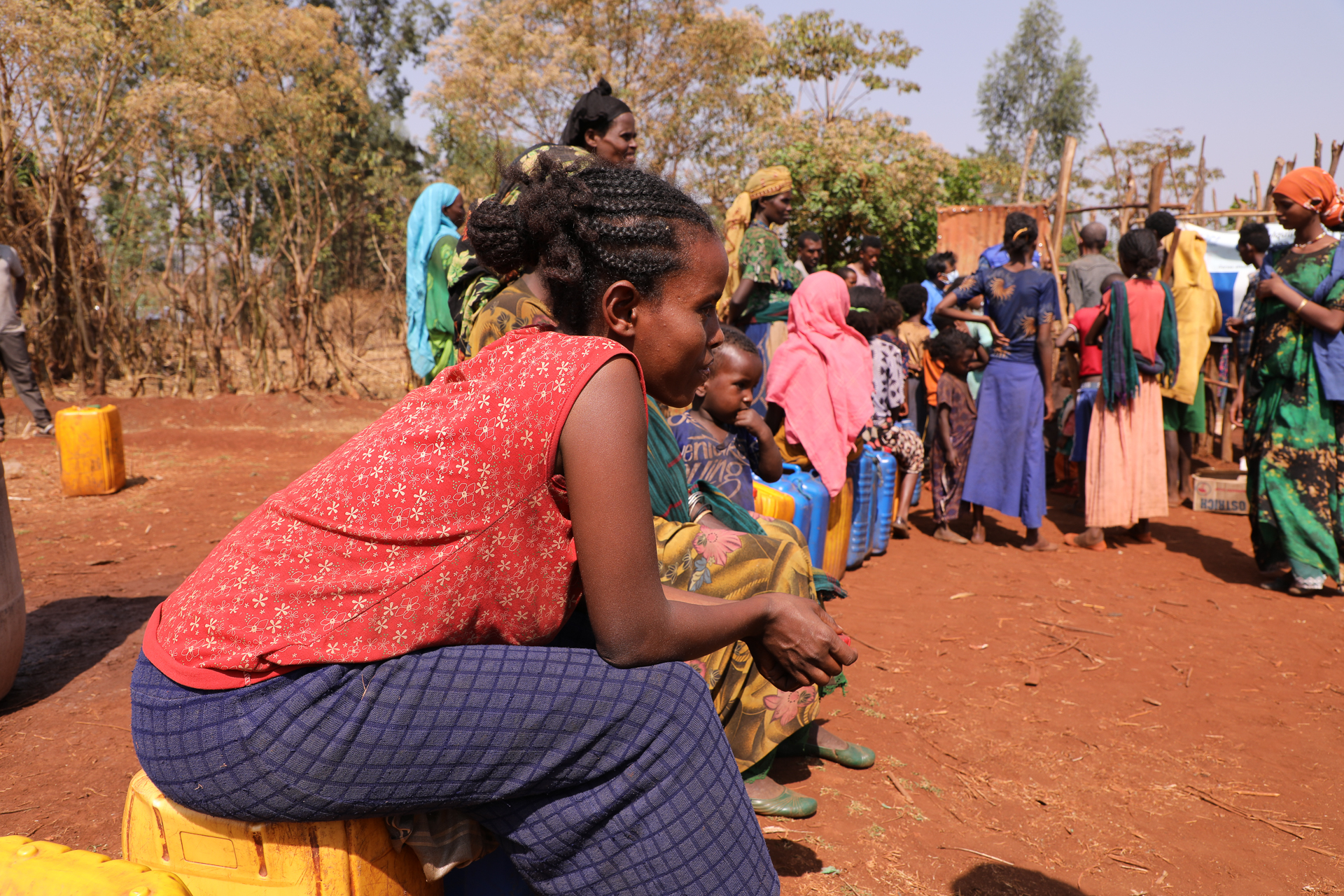Nekemte, 29 Nov 2021 – Access to clean and safe water remains out of reach for thousands of people in many remote villages in Ethiopia. Families are left with no choice but to drink from polluted water sources, including rivers and shallow ponds often located kilometres away. Districts like Sasiga and Guto Gida in Wollega zone in Oromo region are among the most deprived.
The towns of Kenaf and Amistegna are only about 70 kilometres from Nekemte city’s water reservoir, but thousands of residents have no access to water because delivery infrastructure is missing.
“The closest river is 30 minutes to one-hour walk from our home. Carrying water from the river for such a long distance exposes many women to extreme hardship,” says Amina Osman, a resident of Amistegna town.

A woman fills her jerricans at a handpump IOM installed to serve households in Amistegna resettlement area for returnees in Wollega, Ethiopia. Photo: Alemayehu Seifeselassie/IOM
In response, the International Organization for Migration (IOM) has installed a handpump in Amistegna town that has helped ease the daily suffering that many women like Amina face.
“This is clean and safe water, and now we can access it day and night without fear as there is always good visibility due to the newly fitted solar light,” says Amina, an elderly mother.

Workenesh Legesse collects water for household use at a protected spring catchment built by IOM in Kenaf. Photo: Alemayehu Seifeselassie/IOM
For Workenesh Legesse, a mother of four in Sasiga, a new spring catchment is a huge relief. “Our children were suffering from waterborne diseases and accessing water for daily sanitary purposes was a big challenge.''
Mothers like Workenesh and Amina were spending hours every day walking to rivers to fetch water in 20-litre plastic containers they would carry on their backs.
Construction of water projects like handpumps, and protected spring catchments by IOM benefit not only families but also schools in rural areas. In total, IOM has built seven protected spring catchments, installed five new handpumps and rehabilitated eight handpumps in three districts, reaching more than 12,500 individuals in East Wollega alone.
“Due to budget constraints, the government of Ethiopia relies on partners to provide remote villages access to clean water. Many people – who have been at risk of waterborne diseases – are delighted and are now benefitting from IOM’s water schemes,” says Dabala Wagari, a representative of the East Wollega Water and Energy Office.
As well as the construction of water-related projects, IOM is conducting mass hygiene campaigns in the same area that have reached more than 34,000 people since 2019. Another 68,300 people will also benefit from a new hygiene campaign through school awareness programmes, door-to-door visits, public campaigns, and engagement of key stakeholders such as local government officials, religious leaders and health workers. In addition, protective equipment, cleaning materials, and handwashing stations have been distributed for free.
IOM’s school awareness programmes educate students on issues such as COVID-19 prevention and how to use water sparingly. To achieve these goals, IOM teamed up with three theatre groups using dance and theatrical performances as part of the awareness campaign.

A theatre group performs at Kenaf Public School in an event to commemorate World Water Day. Photo: Alemayehu Seifeselassie/IOM
“Such programmes are vital during COVID-19 and when access to water has been more important than ever,” says Karuppiah Vedharaniyam, Head of IOM Wollega Sub-Office.
“We have carried out 17 school campaigns with necessary awareness messages, conducted handwashing demonstrations, underlined the importance of physical distancing, and mobilized stakeholders in East Wollega and West Wollega.”
As part of the project, IOM has also renovated four health institutions and 14 communal latrines at health institutions, desludged 10 communal latrines, constructed four ventilated improved pit latrine (VIP) blocks at schools and built more than 10 multi-purpose school halls in Wollega.

A communal kitchen being built at Sasiga Berida Town as part IOM Site Management Support in Wollega. Photo: Alemayehu Seifeselassie/IOM
“At our school, the toilet facilities were in urgent need of repair and we lacked facilities such as clean toilets for boys, girls and disabled children,” says Zelalem Adisu, Principal of Kenaf Public School. “After IOM rehabilitation, the latrines have greatly improved hygiene, and female students have privacy and feel safe, although water supply remains a problem.”
What a difference for the students. “If we needed to use the toilet during classes, we had to go back home as the school toilets were not usable,” says 15-year-old Beretu Tinsae.
IOM’s essential support came through generous funding received from the Ethiopian Humanitarian Fund (EHF), European Civil Protection and Humanitarian Aid Operations (ECHO), the Government of Germany, the Government of Japan, Korea International Cooperation Agency (KOICA), and USAID’s Bureau for Humanitarian Affairs (BHA).
For more information, contact Alemayehu Seifeselassie, Communications Officer, IOM Ethiopia, Email: salemayehu@iom.int, Tel: +251 911 639 082 or Eric Mazango, Communications Officer, Email: emazango@iom.int, Tel: +251 904 645 879



